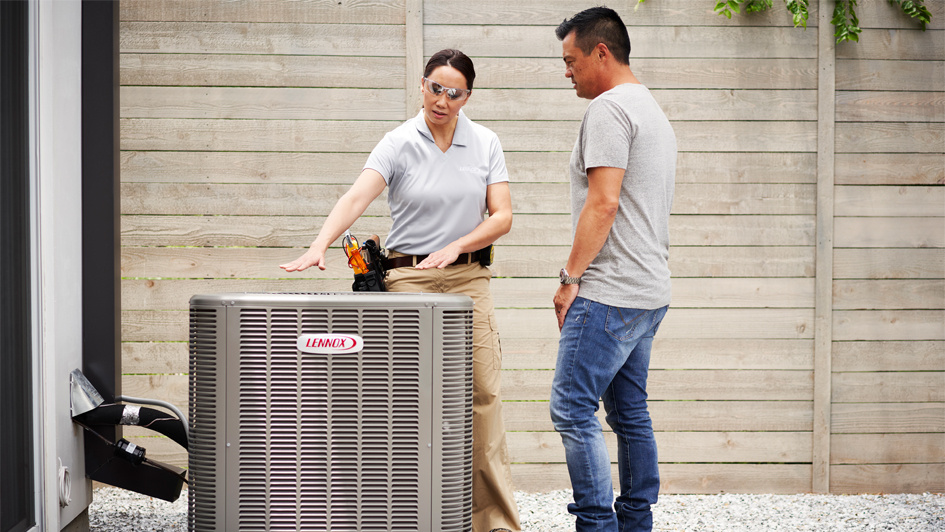
Selecting the appropriate HVAC system size for your home is vital. It impacts your home enjoyment and your energy bills. In this HVAC sizing guide, the professionals at May's Heating & Air will explain how to select the right size of heating and cooling system for your home, what features they take into account and why selecting the best size HVAC is so important to your comfort.
Why HVAC System Size Matters for Home Comfort and Efficiency
Proper HVAC size varies for every home. Your HVAC system needs adequate heating and cooling capacity to make your entire home comfortable. It shouldn't have to work extremely hard to keep up in extremely warm or cold weather. However, an HVAC system that's oversized is inefficient, wastes money and can lead to complications that make your home less enjoyable.
Critical Factors Pros Consider for HVAC Sizing in Frederick, MD
To determine the correct HVAC system size for a home, the HVAC installation experts at May's Heating & Air carry out a Manual J load calculation to determine how many British Thermal Units (BTUs) are necessary to heat and cool and the home. A Manual J calculation evaluates multiple factors, such as:
- Home size: The total area of the home is arguably the most significant factor in selecting the size of your HVAC system. How much space will your new HVAC system be required to keep comfortable?
- Insulation levels in the home: A fully insulated home maintains the indoor temperature more effectively, which can impact how much heating and cooling power you require.
- Climate: The local climate in Frederick, MD, has a major role in determining the right size HVAC. Homes in hotter climates may require a system with a greater cooling capacity, while chillier regions may demand less.
- Window size: Windows can be a major source of energy loss. The number, dimensions, type of glass used, and whether they’re single paned or double pane can significantly impact heating and cooling requirements.
- Sun exposure: A home that receives a lot of sunlight will automatically be warmer than one that doesn't, which influences central air sizing. Orientation in relation to prevailing winds and number of nearby shade trees also impact the correct HVAC size.
Most Common DIY HVAC Size Mistakes
A common mistake homeowners make when choosing the size of home HVAC system is to rely solely on square footage. Although the square footage of your home has a major impact on what size HVAC you need, other elements also influence how much heating and cooling capacity is necessary to keep your home pleasant.
Another typical mistake is not employing a professional. It's vital to have a skilled HVAC technician perform a Manual J calculation, which takes all the essential aspects of your home into consideration to establish the correct HVAC size.
What Difference Does HVAC System Size Make?
An inadequately sized system can cause comfort problems and cost you money. Here's a detailed view of the pitfalls of a incorrectly sized HVAC:
Undersized HVAC system problems:
- Reduced lifespan and breakdowns: HVAC systems that are too small often seem to run all the time to strive to maintain the temperature in a home, leading to more wear and tear. This can cause breakdowns and even require premature HVAC replacement.
- An unpleasant home: Small HVAC systems lack the necessary capacity to heat and cool your whole home, which can lead to hot, stuffy rooms or areas of your home that are chilly and uncomfortable.
- Increased energy bills: An underpowered HVAC system that runs continuously trying to keep up uses more energy, driving up your monthly power bills and wasting your hard-earned money. A properly sized and energy-efficient HVAC system consumes less energy and helps to reduce your monthly bills.
Problems with HVAC systems that are too big
- Wasted money: Larger HVAC systems typically have a higher purchase price, so buying more heating and cooling capacity than your home needs is an avoidable expense.
- Shorter system life and breakdowns: HVAC systems that are oversized often cycle on and off, referred to as short cycling. This can cause wear and tear on your equipment, reducing its service life or requiring HVAC repair.
- Increased humidity: An HVAC system should balance indoor air moisture, but an oversized HVAC system may lack adequate runtime to accomplish that task. This can lead to indoor air quality issues, and encourage the growth of mildew or mold.
Get Help Replacing or Sizing Your Home HVAC System from May's Heating & Air
Now that you understand some of the aspects of your home that affect what HVAC system size is right for you, it's time to find a new heating and cooling system. May's Heating & Air can help.
We’ll evaluate your home and give you a free, no-obligation estimate for HVAC installation. We’ll assess your home to determine the ideal HVAC system size for you, so you can have a comfortable home every day of the year.
Call 301-834-1468 today to set up your free estimate for HVAC installation in Frederick, MD.
